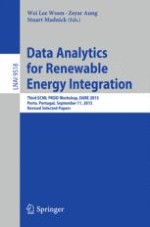2015 | Book
Data Analytics for Renewable Energy Integration
Third ECML PKDD Workshop, DARE 2015, Porto, Portugal, September 11, 2015. Revised Selected Papers
Editors: Wei Lee Woon, Zeyar Aung, Stuart Madnick
Publisher: Springer International Publishing
Book Series : Lecture Notes in Computer Science
